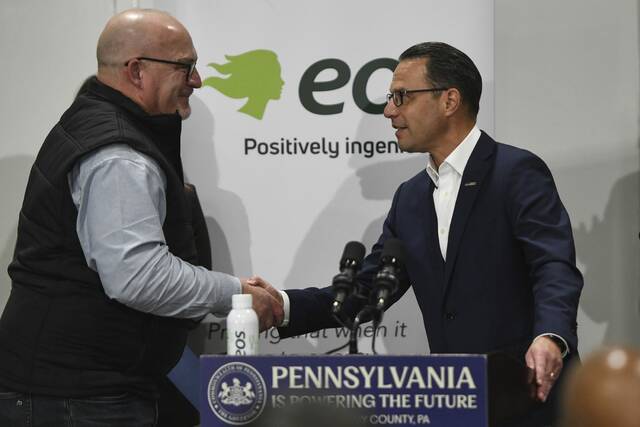https://triblive.com/opinion/editorial-big-money-big-batteries-and-big-questions/
Editorial: Big money, big batteries and big questions

A manufacturing company wants to expand. It makes announcements. And when the big news comes, there is another disclosure.
The federal government is along for the ride.
That might sounds like the U.S. Steel-Nippon Steel deal that included a “golden share” specifically controlled by President Donald Trump.
It also describes developments with Eos Energy Enterprises.
It is no surprise that economic development deals often come packaged like luscious Christmas gifts, wrapped in glittery paper and topped with pretty bows. This can be true of the opportunity zone deals that bring in a business with promises of no taxes for a period of time. The glitter increases the higher you climb on the government ladder.
Tuesday’s announcement about Eos is no different. The October announcement of a $350 million expansion was heralded with fanfare. Gov. Josh Shapiro called it a game changer. It was a boon for the city of Pittsburgh, the region and the state.
Now comes the follow-up information.
The company is receiving a $305 million federal loan. As part of that deal, the U.S. Department of Energy gets the right to buy 570,000 shares at the bargain-basement price of one penny each. That makes the government’s purchase cost $5,700. It nets the government a stake worth about $7 million.
It’s becoming a common practice for the Trump administration. Similar deals have been cut with computer chip giant Intel and Nevada-based rare-earth minerals mining company MP Materials. There is a profit-sharing arrangement with Westinghouse regarding nuclear reactors.
But is common a good thing? There are questions to ask before that can be answered — and maybe before celebrating big deals.
Those questions include things like, what kind of input the federal government should have in these companies? Washington always has some say when it has to give approval or it enforces regulations, but being an actual stakeholder changes the game. Yes, the government will hold less than 1% of Eos stock, but how much sway will that particular percent hold?
Speaking of sway, does the federal government holding a piece of a company give that company an advantage over competitors in terms of contracts and clients? Will that be an issue that can break as many companies on one side as it builds on the other?
And will all of this require more and better laws to clarify or codify those questions?
The people — and the businesses, as well as states and municipalities — need clarity on this braided relationship of government and industry.
There needs to be protection for all concerned. There needs to be a clear understanding of the risks and benefits. There needs to be a hard, sharp line for where a company’s autonomy and the government’s authority meet.
This isn’t to say that any of it is bad. The Eos project is exciting to watch. There is promise and potential.
But a good idea can’t just be applauded. It must also be appraised skeptically for its own protection.
Copyright ©2026— Trib Total Media, LLC (TribLIVE.com)
